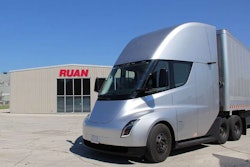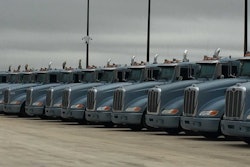This is the second of a two-part commentary from Fleet Advantage Chief Executive Officer John Flynn looking at adapting to operational changes during COVID-19 and how fleets can position themselves for post-pandemic success. Similarly, CCJ will host an online event, “Upshift: How to Find Opportunities During This Challenging Time,” May 27-28. Registration to the event is free for carriers. Visit www.ccjsymposium.com
It’s very important that transportation fleets recognize they must be as flexible as possible with their own business models. With the closing of restaurants, many food distributors need to reallocate their trucks and resources to help with demand on the grocery side. This has created a shift in some fleets and the way they approach their own business and driver programs.
 John Flynn is Chief Executive Officer of Fleet Advantage.
John Flynn is Chief Executive Officer of Fleet Advantage.Some fleets are suddenly in need of additional trucks to help keep up with increased capacity demand. These are immediate needs, and the structure of their truck deal needs to be flexible to meet this urgent demand, but also allow them to return the asset when the impact of the current circumstances return to normal, which is an unknown at this point.
One option that works well in this type of scenario would be a sale-leaseback agreement. A fleet can select the assets that are older models, which are inefficient and more unreliable, and work with a firm that can purchase those assets and lease them back for an interim period, and then transition to new equipment when ready. This would enable the fleet to generate cash. The cash gained can then be used for immediate internal needs or simply provide extra working capital.
Where fleets are leveraging data for optimization
Fleet executives, find out how to outperform in this down market.
Richard Stocking, CEO of DPX Consulting, will provide advice on how to maintain a healthy bottom line and take advantage of new business opportunities — during our free, virtual CCJ Symposium on May 27-28. Get Details.
Additionally, it is essential to have advanced data feed capabilities that upload in real-time compared with backward-looking data that only looks at the previous month’s data. This is crucial for managing through items such as mileage, MPG, idle time, routing and driver hours, and it will allow fleets to most efficiently navigate through the extraordinary pace of changes due to COVID-19.
Learning from COVID-19 and positioning for long-term success
With this knowledge, transportation fleets can quickly and successfully adapt to their changing requirements, keep drivers and customers safe from the additional spreading of the COVID-19, and adequately maintain trucks while preserving as much of their bottom line as possible while we all help each other through this time of uncertainty.
But it is important that fleets remain focused on the larger picture, with long-term business strategies in mind. Proactive fleets that may have been considering modernizing their fleet and updating their equipment will realize that this is an opportune time to analyze the age of their assets and plan for the recovery. Fleets should recognize that pent-up demand will eventually be realized and further stimulated by additional government stimulus packages. Therefore, transportation fleets will need to be prepared to accommodate with updated equipment that offers advanced safety features at all-time low rates, providing significant savings in operational costs.
John Flynn is Chief Executive Officer of Fleet Advantage, a leading innovator in truck fleet business analytics, equipment financing and lifecycle cost management.













